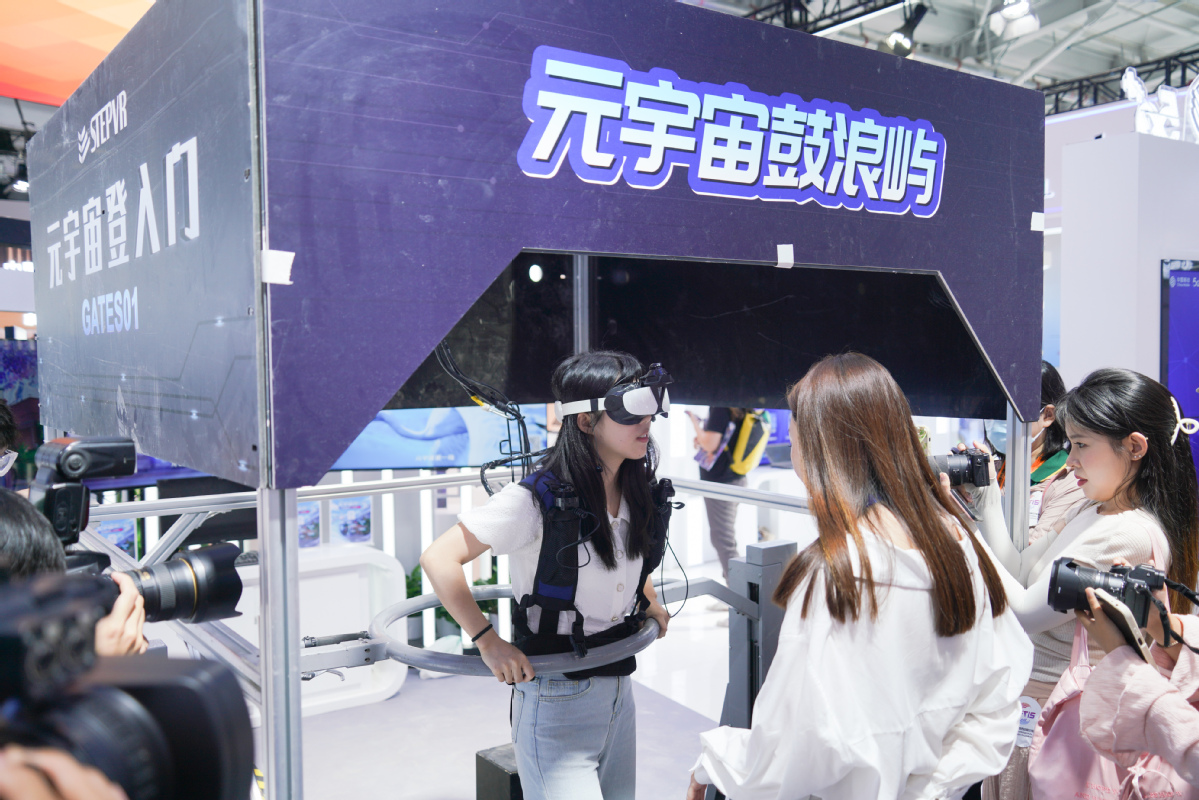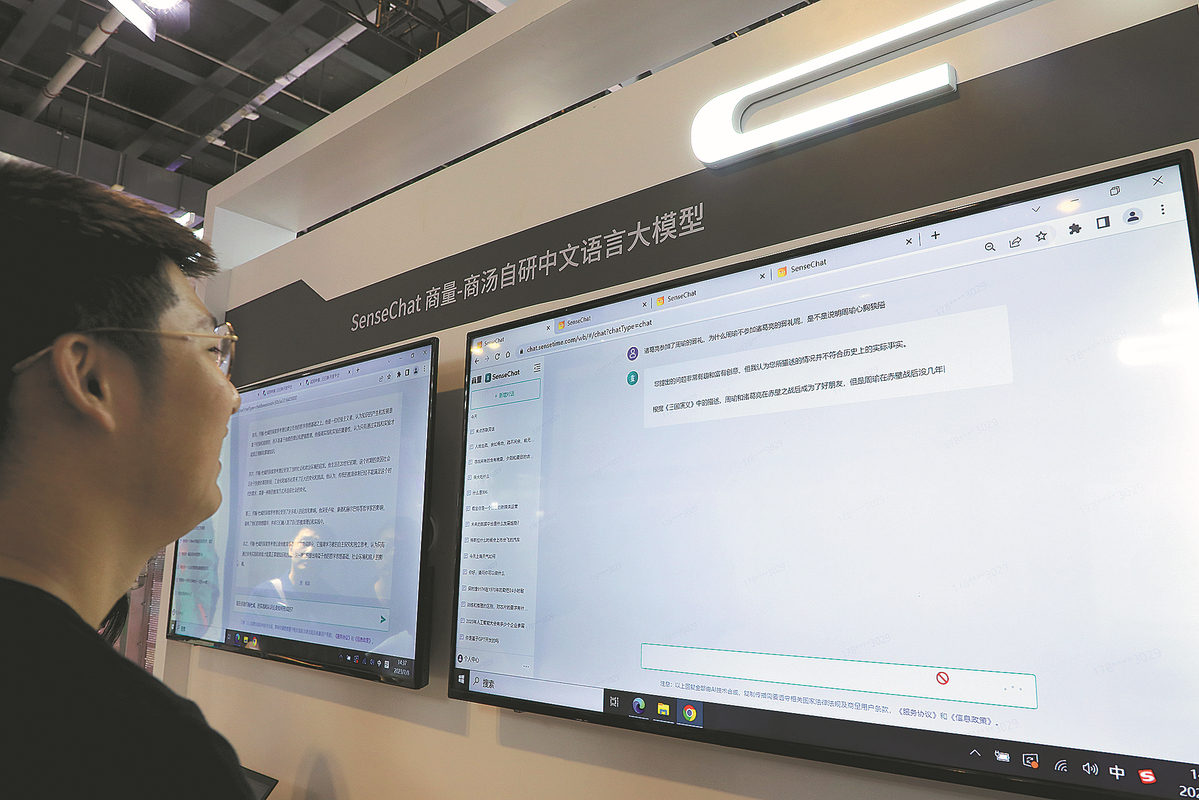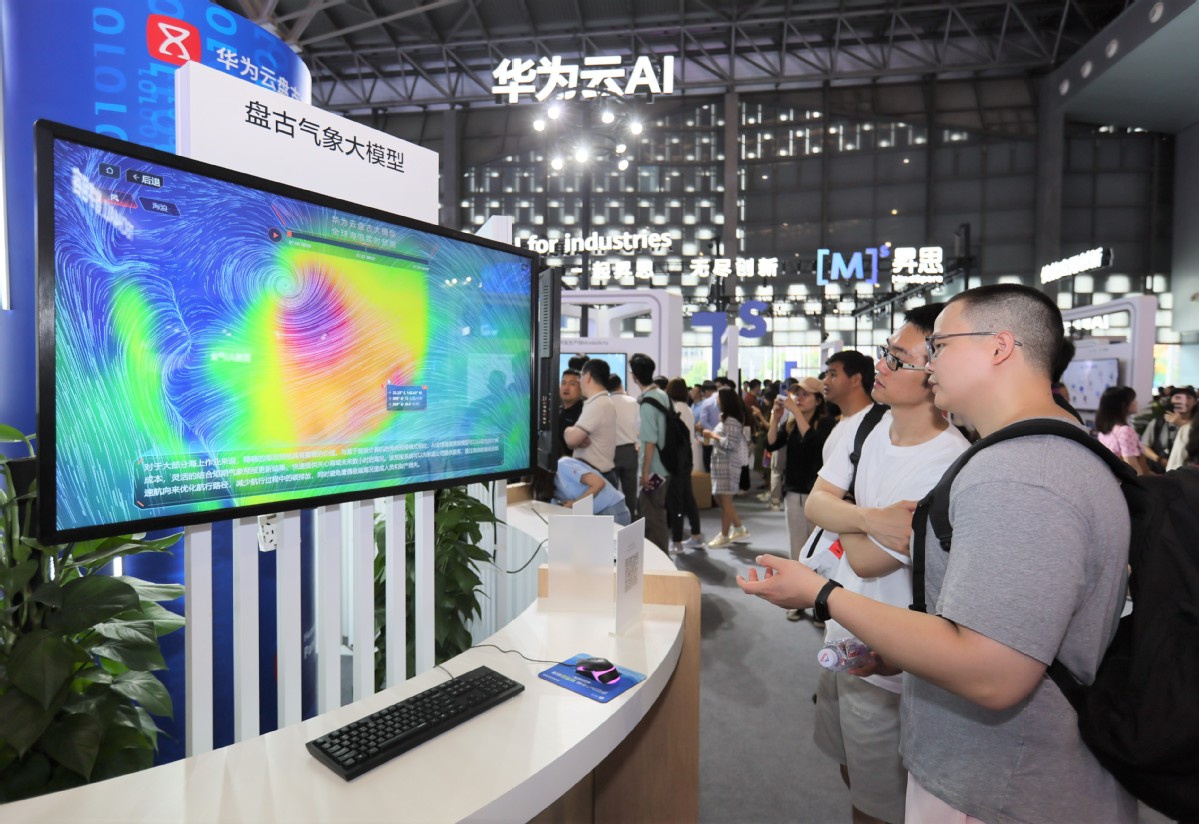Nation sets impressive pace on AI applications

A visitor tries her hand at Metaverse Gulangyu Island at the China Mobile booth during the 2023 CIFTIS. CHINA DAILY
Experts predict generative use of technology to have far-reaching impact
The meteoric rise of generative artificial intelligence has the potential to be a major game changer for businesses, industry experts said.
Generative AI could revolutionize various industries as major Chinese technology companies double down on efforts to bolster the commercial application of AI-powered large language models, or LLMs, in a wide range of sectors, the experts added.
Chinese enterprises are at a crucial stage of making breakthroughs in generative AI, and should invest more in building exclusive AI models that are more efficient and offer tailored and precise services to users, the experts said. They also emphasized the importance of safeguarding core and sensitive data and user privacy from potential leaks.
Generative AI refers to computer algorithms trained with huge amounts of data capable of generating content such as images, text, audio and video. It is the key technology underpinning ChatGPT, an AI chatbot that has taken the world by storm and triggered a new AI wave. ChatGPT was developed by AI research company OpenAI, which is based in the United States.
A report from global consultancy McKinsey &Co said that generative AI will add between $2.6 trillion and$4.4 trillion in annual value to the global economy, and have a significant impact across all sectors of industry.
Banking, high technology and life sciences are among the industries that could see the biggest impact as a percentage of their revenues from generative AI. Across the banking industry, the technology could deliver an additional$200 billion to $340 billion value annually if it is fully implemented, the report said.
ChatGPT, an acronym for Chat Generative Pre-trained Transformer, has shown its strong capabilities in writing essays, checking program bugs and making business plans in a human-like fashion.
Chinese companies are stepping up their attempts to develop AI-powered LLMs - potential rivals to ChatGPT - and promoting the large-scale commercial use of such models. LLMs are AI models fed huge amounts of text data for use in a variety of tasks, ranging from natural language processing to machine translation.
On Thursday, eight Chinese companies and research institutions opened their AI-powered LLMs to the public after receiving approval from the authorities.
They include tech heavyweights Baidu and ByteDance, AI companies Baichuan Intelligent Technology, SenseTime, Zhipu AI and MiniMax, as well as research institutes the Chinese Academy of Sciences and Shanghai Artificial Intelligence Laboratory.
Alibaba Cloud, the cloud computing unit of Chinese tech heavyweight Alibaba Group Holding, recently introduced two open-source LLMs, Qwen-7B and Qwen-7B-Chat, which it said could be put into commercial use. It is the first time a large Chinese tech company has open-sourced LLMs.
The company said these LLMs will help enterprises simplify the process of model training and deployment, as they only need to fine-tune the models and build their own high-quality AI models efficiently and cost-effectively.

A visitor looks at an artificial intelligence-powered large language model during an expo in Shanghai. [Photo/China Daily]
In July, US tech company Meta rolled out a similar open-source model, the Llama 2, for commercial use.
Zhou Jingren, chief technology officer at Alibaba Cloud Intelligence, said, "By open-sourcing our proprietary large language models, we aim to promote inclusive technologies and enable more developers and small and medium-sized enterprises (or SMEs) to reap the benefits of generative AI."
In April, Alibaba unveiled its Tongyi Qianwen LLM, joining the race to offer a potential rival to ChatGPT. Experts said the launch of two small-sized versions of Tongyi Qianwen will lower the threshold for the use of LLMs, and allow SMEs and developers to start using AI more quickly.
The two models will be free for use by companies with less than 100 million active monthly users. Companies with more than this number of users can request a license from Alibaba Cloud, the company said.
Lu Yanxia, research director at market consultancy IDC China, said the introduction of open-source AI models will make AI services accessible to more enterprises, help them build customized industry-specific LLMs, and boost technological advances and the commercial application of LLMs.
More Chinese tech companies will likely launch open-source models in the coming months, Lu said, adding that LLMs have triggered a new AI wave and brought fresh business opportunities for domestic AI servers, cloud computing and chip companies.
"The LLMs will speed up integration with a wide range of industries and application scenarios, which necessitates a higher demand for data and knowledge in professional fields, and for talent that can fine-tune specialized models based on diverse industrial demands," Lu said.

Visitors check out Baidu's large language model Ernie Bot during a high-tech expo in Shanghai in July. [Photo/Xinhua]
Market opportunity
A report released by the Institute of Scientific and Technical Information of China said that as of May, the nation had developed at least 79 AI LLMs.
Other Chinese tech giants such as Baidu, Tencent Holdings, SenseTime and JD have been busy rolling out their own AI models in recent months.
Robin Li, co-founder and CEO of Baidu, said: "Generative AI and large language models hold immense transformative power in numerous industries, presenting a significant market opportunity for us. To stay ahead of the game, we keep upgrading our models to generate more creative responses while improving training throughput and lowering inference costs."
Li said Baidu will further intensify its generative AI efforts, and plans to roll out the latest version of its LLM, Ernie 4.0, by the end of this year. The company, which unveiled its Ernie 3.5 LLM in the second quarter of the year, has been embedding the Ernie AI model into its products, including search engines, Baidu Maps, and online marketing business.
Baidu is committed to building new growth momentum for generative AI and LLMs to drive sustainable long-term development, Li said. He emphasized that the company is working hard to build Ernie-powered applications and solutions for different industries and scenarios, and empower more enterprises to create industry-specific AI models and applications.
Last month, Chinese authorities issued a 24-point guideline for managing generative AI services. The nation encourages the innovative development of generative AI, and supervises the technology using methods compatible with innovation and development.
Interim measures support use of the technology in various fields to produce positive and high-quality content, and encourage the independent innovation of basic technologies, including generative AI algorithms, frameworks, chips and software platforms.
Li said, "The Chinese government has been increasingly supportive of the development of generative AI and LLMs," adding he is quite optimistic about the future of the regulatory environment in China, as the latest AI rules are "more pro-innovation than regulation".
Zhang Yaqin, dean of Tsinghua University's Institute for AI Industry Research, said although ChatGPT was not developed in China, about 100 Chinese companies have entered the generative AI field over the past six months. Some have rolled out LLMs, while others are developing industry-specific models covering fields such as biological computing and education, Zhang said.
"China has been doing some terrific work in basic research, algorithms and industrial application of AI models, and generative AI has brought about disruptive changes to the entire industry," Zhang added.
Pan Helin, co-director of the Digital Economy and Financial Innovation Research Center at Zhejiang University's International Business School, said, "China has gained an upper hand in bolstering the industrial application of AI compared with its foreign counterparts, given that the country boasts relatively complete industrial categories, an ultra-large consumer market and a strong development foundation."
Although LLMs have significant potential in fields such as culture, retail, finance, healthcare and education, their real value comes from the consumer market, and the ultimate goal of LLMs in industrial application is to benefit the people, Pan said.
He added that Chinese AI companies should devote more resources to improving computing power, algorithms and data quality, and step up investment in basic scientific research to gain a competitive edge in the global AI chatbot race.
Market consultancy Gartner predicts that by 2025, generative AI will account for 10 percent of all data created, compared with less than 1 percent last year, and it could be used for activities such as creating software code, facilitating drug development, and targeted marketing.
Yu Yi, technology lead for global consultancy Accenture China, said, "As generative AI will have a far-reaching impact, business leaders must act immediately and scale up investments in data, talent and customized AI models to meet enterprises' unique needs."
Most Chinese executives agree that generative AI will trigger significant creativity and innovation, and usher in a new era of enterprise intelligence, Yu added.
China has officially launched the formulation of a national standard for testing LLMs, and the nation's first standardization task force for LLMs was formed during the sixth World Artificial Intelligence Conference, which ended in Shanghai on July 8.
The task force, headed by the Shanghai Artificial Intelligence Innovation Center, consists of six joint team leaders - Baidu, Alibaba Cloud, iFlytek Co, 360 Security Technology, Huawei Cloud and the China Mobile Research Institute.
It will be responsible for drafting LLM standards to promote the combination of LLM technology and standardization practice, and boosting the healthy development of the overall AI industry.

Visitors check out Huawei's Pangu-Weather, a powerful AI-based weather forecasting system, during the World Artificial Intelligence Conference 2023 in Shanghai on July 6. [Photo/Xinhua]
Great progress
Chinese AI pioneer SenseTime has made great progress in promoting the industrial application of LLMs in finance, healthcare, e-commerce and intelligent terminals. The company, which is based in Shanghai, launched its self-developed LLM SenseNova in April, which covers key capabilities such as computer vision, natural language processing and AI-generated content.
Xu Li, chairman and CEO of SenseTime, said the breakthrough in LLMs has sparked a new technological revolution in AI, leading to significant growth in industry demand and the emergence of new application scenarios and formats.
For example, in the financial sector, SenseTime is collaborating with banks, insurance companies and brokers to use digital humans for intelligent customer service and marketing. Powered by its LLM capabilities, the company offers investment research analysis and report-writing services, which will help banks and other financial institutions reduce costs and increase efficiency.
SenseTime has also developed a Chinese-language medical LLM built on a vast amount of medical knowledge and clinical data. This model can provide multi-round conversation capabilities for health consultation and guidance services, and help doctors improve diagnosis and treatment efficiency.
Furthermore, Chinese e-commerce giant JD unveiled its large language model ChatRhino in July, which could be used in a wide range of fields, including retail, logistics, finance, and health, as the company aims to bolster digital transformation and upgrade various industries by using AI.
The model will be deployed within JD's core business areas in the second half of this year, the company said.
Xu Ran, CEO of JD, said the company has accumulated huge amounts of data and knowledge from extensive industrial scenarios, and it will strengthen cooperation with industry partners to promote technological innovation.
A report compiled by the Institute of Scientific and Technical Information of China said the nation has made remarkable progress in AI- ranking second in the Artificial Intelligence Innovation Index for the third consecutive year, trailing only the US.
Zhao Zhiyun, director-general of the institute, said China has seen its rankings in networks, talent, education, system innovation and patents rise, but there is still plenty of room for improvement in innovative scale and quality.
Global market research company International Data Corp said China's spending on AI will likely reach $14.75 billion this year, accounting for about one-tenth of the global market. The scale of the nation's AI market is expected to reach $26.44 billion in 2026, with a compound annual growth rate of more than 20 percent from 2021 to 2026.
Local governments have launched policies to better promote the innovation and development of AI. For instance, the core industry scale of AI in Beijing is expected to reach 300 billion yuan($41.1 billion) by 2025, according to a plan released in the Chinese capital in May.
In Guangdong province, the authorities in Shenzhen have proposed using 100 billion yuan of funding for AI, strengthening the supply of intelligent computing power clusters, enhancing the innovation ability of key core technologies and products, and industrial agglomeration (firms in the same industry being located in the same geographic area).
In Shanghai, several policies have been announced to encourage the investment of private capital in new infrastructure and to support private enterprises to take part in constructing AI infrastructure such as data and computing power.
Although AI brings new development opportunities, there are still challenges to face. As data security becomes a rising priority, more efforts are needed to ensure the technology is used safely and responsibly.
A report released by global consultancy Boston Consulting Group, or BCG, said that to promote the large-scale commercial use of generative AI, more needs to be done to improve computing capacity, optimize the training of LLMs, and safeguard data security.
Sun Wei, partner at BCG and core leader of the company's financial institutions practice, said, "It is important for banks to establish a responsible AI system and ensure the fairness, accountability, transparency, privacy and security in the application of generative AI."
Photos
Related Stories
- AI-powered LLMs now open to public
- Baidu rolls out AI chatbot service to public
- First artificial intelligence gala held in Beijing
- Alibaba Cloud launches digital lab in Japan
- China mulls tougher rules against academic misconduct
- China's AI investment expected to exceed 38 bln USD in 2027
- AI opens new space for artistic creation
- Beijing to further regulate online medical services, prohibit AI generated prescriptions
- China-Oman high-tech cooperation contributes to Oman's digital transformation: expert
- Chinese firm iFLYTEK launches new version of AI language model
Copyright © 2023 People's Daily Online. All Rights Reserved.









